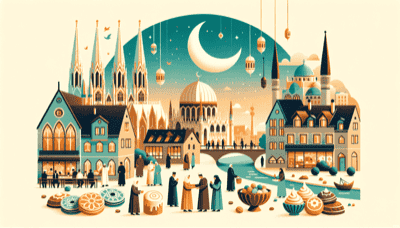We're here to help you keep count of the days to or since a date. Just click the button below and enter your chosen date to get started. Also choose the suggested days or search for a special day above #countingthedays

Eid ul Fitr, known as "Zuckerfest" in German (meaning "Sugar Feast"), marks the end of Ramadan, the Islamic holy month of fasting. It is one of the most important religious holidays for Muslims worldwide, including those in Germany.
The celebration of Eid ul Fitr has its roots in the Islamic tradition established by the Prophet Muhammad. It dates back to 624 CE when Muhammad first observed the festival after the victory at the Battle of Badr. Over time, it has become a period marked by communal prayers, feasting, and charity.
In Germany, Muslims begin the day with a special prayer called Salat al-Eid, which is typically held in large open spaces or mosques across cities like Berlin, Frankfurt, and Cologne. The community-led prayers foster a spirit of unity and reflection.
Following prayers, it is traditional for Muslims to visit friends and family, exchange gifts, and enjoy festive meals. Children often receive sweets and presents—a reason for the alternative name "Sugar Feast." Donations and acts of charity (Zakat al-Fitr) are also an integral part of Eid, aimed at helping those less fortunate.
With a significant Muslim population resulting from diverse backgrounds including Turkish, Arab, and South Asian communities among others, Germany sees varied cultural expressions during Eid. Festivities might include:
Despite being a working day in Germany—unless it falls on a weekend—Eid ul Fitr is observed with high spirits among Muslim communities who take personal time off to celebrate with their loved ones. The holiday serves as an opportunity to strengthen communal bonds within the Muslim population while also engaging with broader German society through shared moments of joy and goodwill.